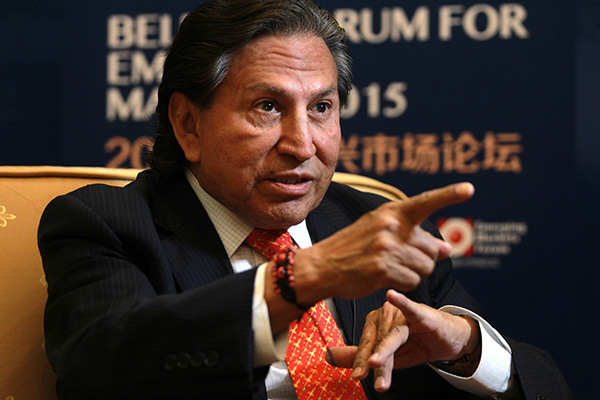|
 |
|
Alejandro Toledo, Peru's former president. [Photo/China Daily] |
Peru wants Chinese companies in its infrastructure construction sector to diversify their investment portfolio, rather than just focus on mining, according to Alejandro Toledo, the country's former president.
"Peru is a country with incredible biodiversity. Yet it is also a geographically accidental land. If China can help build railways and roads to speed up transportation and lower costs, our agricultural products can be more profitable," Toledo told China Daily on Sunday.
Toledo, who served as president from 2001 to 2006, is in Beijing to attend the two-day Beijing Forum for Emerging Markets which ends on Tuesday.
According to the Ministry of Commerce, China had invested more than $14 billion in Peru by the end of 2014, making it the second-largest investment destination in Latin America.
A large part of the investment has gone into the mining industry. Last year, MMG Ltd, a consortium led by China Minerals Corp, purchased the Las Bambas copper mine in Peru for about $7 billion, China's largest overseas purchase in the mining industry.
"Minerals are finite resources," said Toledo.
"But if we can export, say, 5 percent of our grapes to China, I would be even more happier."
Mineral resources account for about half of Peru's exports. Peru is the world's third-largest copper producer, after Chile and China. But the country's exports dropped 8.1 percent year-on-year in the first six months of the year, mainly due to shrinking exports in minerals, including copper, according to figures from Comex Peru, an organization that promotes foreign trade.
China's mining investments in Peru have faced criticism recently. Local people have been protesting against the building of the mineral processing plant in Las Bambas, complaining that it will contaminate their water and crops.
Toledo suggested that allowing local communities to benefit from such mining projects would help reduce social discontent. In his view, infrastructure projects are a great way to benefit communities by increasing their agricultural products' access to the international market.
"If I were elected again, I would build a railway from the frontier with Chile to the frontier with Ecuador. With insertion of the railways in various parts of the country, we will be able to get the products out of those regions," said Toledo.
China is Peru's largest trading partner. Trade between the two sides reached $14.32 billion last year, down 2 percent over the previous year.
A free trade agreement between the two countries took effect in 2010. China mainly imports minerals, base metals, food and tobacco from Peru. The Latin American country currently imports electronic products, textiles, furniture and toys from China.
In May, during Premier Li Keqiang's visit, China, Brazil and Peru agreed they would conduct a feasibility study for a proposed transcontinental railway in South America.
Zhang Sengen, a researcher with the Institute of Latin American Studies at the Chinese Academy of Social Sciences, said: "China's investment in Peru should move up the value chain to sectors such as agro products, processed food and eco-tourism.
"To tap into the rich resources in Latin America, infrastructure construction is the first step that can lay a solid foundation for future growth, just as what has happened in China in the past few decades."
